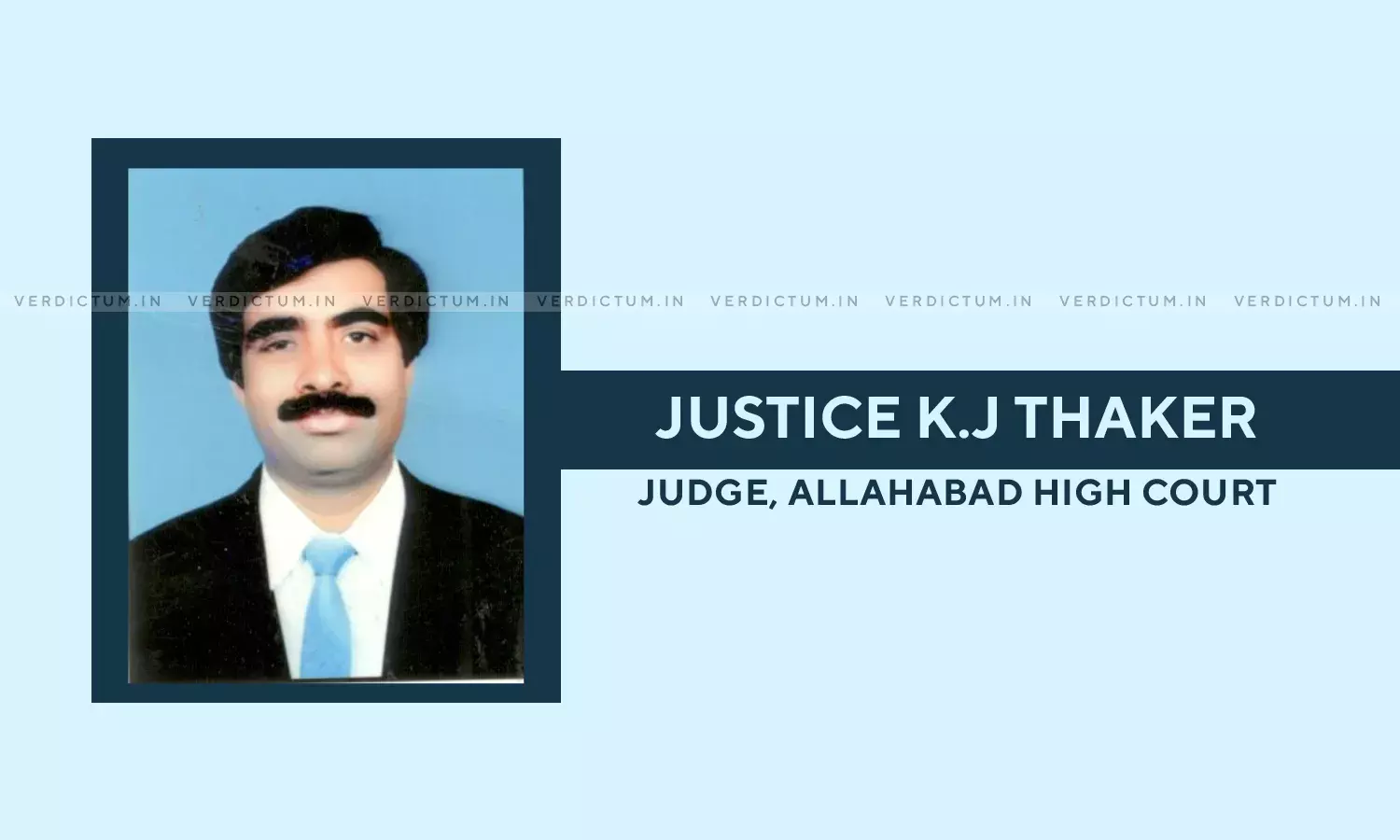In Conversation: Justice Kaushal Jayendra Thaker, Judge Allahabad High Court

Justice K. J. Thaker was born in a family of lawyers in Bombay. His father late Shri Jayendra M. Thaker was a Judge in the City Civil & Sessions Court, Ahmedabad. Justice Thaker passed his LL.B. from Sir L.A. Shah Law College, Ahmedabad and topped the Gujarat University. Thereafter, he pursued LL.M. (Commercial group) from L.A. Shah Law College, Ahmedabad. He was awarded a PhD in Environment Law by Gujarat University. He joined the Bar in the year 1987 and started practice with the late Shri N.J. Mehta and then joined the office of Shri K.S. Nanavati. He practised in the High Court of Gujarat, handling Labour Matters, Service Matters, Constitutional Matters, and Civil and Criminal Matters. He was a part-time lecturer at L.A. Shah Law College and M.N. Shah Law College.
His articles are published in various journals of repute on different subjects.
In February 1997, he was appointed as District Judge and worked as such at various places. He has decided various important matters during his tenure as Judge of District Judiciary. He was appointed as an Additional Judge of the High Court of Gujarat and took oath as such on 4th May 2013. He was transferred to Allahabad High Court on 11th April 2016.
In this exclusive interview with Verdictum, he shares his opinion on the issues facing the justice delivery system, legal education etc. through his usual 'crisp and to the point' answers to our questions.
Sir, the pendency of cases and delay in delivery of justice have always been matters of concern. Since you have been part of the lower judiciary and are currently serving in the High Court, what do you believe is the fundamental reason for it?
Justice Thaker: The basic and fundamental reasons for the delay caused in the civil and criminal dispensation of justice are:
(a) Docket explosion which has overburdened the judiciary. More cases are being instituted compared to the rate of disposal of cases.
(b) Unnecessary technical objections which lead to unnecessary adjournments and hence delay the entire trial.
(c) Procedural bottlenecks of lack of infrastructure.
With the advancement of technology, new categories of crime have emerged. In dealing with white-collar crimes and cybercrimes, what difficulties do judges face? Do you believe that laws related to such crimes should be part of the legal curriculum in law schools?
Justice Thaker: New subjects are being introduced into the curriculum in law schools. Earlier, certain laws were not part of the academics, but now, forensics is a part of the legal studies. Changes in legislation also try to meet these new challenges. Teaching environment jurisprudence and cyber laws would change the quality of litigation. There are several courses which have been introduced to give specialisation in subjects like cyber laws etc. Frequent workshops are conducted by the judicial academies as well, to train the judges of subordinate Courts.
What are your recommendations for improving the working of Courts and do you support virtual hearings as a way of hearing cases going forward?
Justice Thaker: Virtual hearings are here to stay. It was an indispensable tool for the functioning of the Courts during the pandemic. Yes, technology has made lots of inroads in the system for delivery of justice. It is helpful in tracking matters and getting similar matters to be decided together. But the work culture and change of mindset are very essential. The judges, lawyers and the staff must employ technology to aid the dispensation of justice. The procedural laws must be detached from the colonial mindset.
You have been part of the Judiciary for a long time and have served both on the bar and the bench; what differences do you observe between then and now?
Justice Thaker: The 80s and 90s were decades with minimal infrastructural development. Now, there are different kinds of aid programmes. Justice is available to the poor (at times on paper). The lawyers are more result-oriented. The law journals are replaced by gadgets and law finder applications. The legal database is now available on our mobiles, which have replaced piles of books and law reviews.
What problems do you confront as a High Court Judge? How do you maintain a work-life balance?
Justice Thaker: Lack of sufficient support staff for Judges, not only at the High Court but at all levels, is a problem. But I think a work-life balance has to be maintained by devising an attitude to work with what is there.
Recently, the Chief Justice of the Telangana High Court said that the conduct of junior judges toward senior counsel needs a course correction. Is it true that senior advocates are not treated properly in the lower judiciary? Did you ever come across such an incident during your tenure?
Justice Thaker: There may be stray incidents. It's mutual.
You worked as a part-time lecturer, early in your career. In the last decade, legal education has seen a revolutionary transformation with the introduction of five-year law degrees and more options for specialisation in law. What are your thoughts on this shift, and what suggestions do you have for reforms in legal education?
Justice Thaker: There has been a big shift. Now the focus is more litigation-oriented and non-litigation oriented education. Specialisation, as in other fields of studies, is increasingly becoming popular in the legal field also. The studies are becoming too expensive (monetarily) and hence only a few get into litigation, which is not very rewarding (monetarily) in the early days of career.

